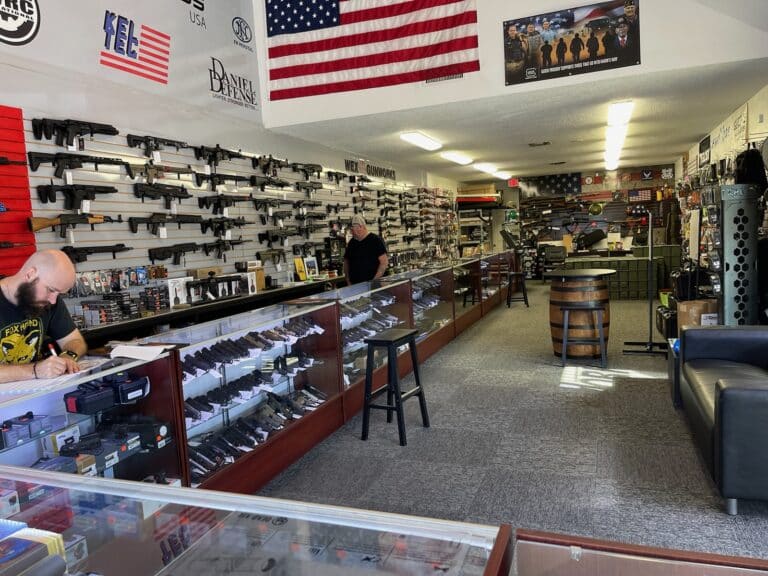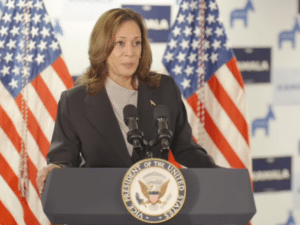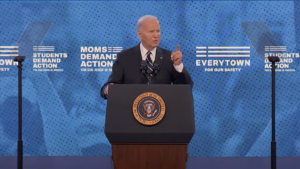Florida banks can’t deny services to gun owners or companies under a new law signed by Governor Ron DeSantis (R.) this week.
The governor signed House Bill 3 on Tuesday, enacting new financial regulations over who banks can cut business ties with and why. Under the rules, banks can’t deny credit or accounts to anyone on the basis that they are lawful gun owners, makers, or dealers. It also bars the state from using so-called “social credit” scores to determine who to do business with or work with any bank that uses the scores.
DeSantis said Floridians need those protections because some companies have begun discriminating against people whose politics they dislike.
“If you’re engaged in traditional energy production, they don’t like that. If you have a gun store or you’re a gun owner, they don’t like that,” he said at a signing ceremony for the bill. “There are certain things that they don’t like. And people feel the brunt of that. So, we wanna make sure that in Florida people have access to these services and they’re not discriminated against based on their political orientation or their religious beliefs or anything like that.”
DeSantis has pointed to the case of licensed gun dealer Brandon Wexler as an example of somebody a large bank rejected over his line of work. The Reload broke the news back in January of Wells Fargo dropping Wexler and Wex Gunworks as customers for reputational risks letters from the bank indicated were related to the industry he operates in.
“Wells Fargo performs ongoing reviews of its account relationships in connection with the Bank’s responsibilities to manage risks in its banking operations,” the bank said in a December 22nd letter to the gun dealer located in Delray Beach, Florida. “We recently reviewed your account relationship and, as a result of this review, we will be closing your above-referenced accounts.”
In a follow-up letter, Wells Fargo said it canceled Wexler’s business line of credit because its “banking guidelines exclud[e] lending to certain types of businesses.”
However, the bank later claimed the closure was not related to Wexler’s work as a gun dealer.
“Based on our analysis of the risk associated with this customer, we made a decision to close the accounts,” Jennifer L. Langan, head of communications for consumer lending at Wells Fargo, told The Reload at the time. “Our decision is not based on the industry.”
Wells Fargo reiterated that its decisions were based on Wexler’s “account relationship and activity” and not his status as a licensed gun dealer in another letter sent to him after The Reload’s article was published.
“To be clear, Wells Fargo does not have a policy against doing business with firearms companies,” the company said in the letter. “Wells Fargo is not exiting the firearms industry and provides financial services to many firearms businesses.”
But Wells Fargo declined to explain in the letters why it considered Wexler a risk after decades of doing business with him. Wexler said the bank did not explain the reasoning when he asked. Wells Fargo did not explain the decision to The Reload either.
Wexler, who is also a professional firefighter, has maintained that he isn’t facing any legal trouble and has no idea why Wells Fargo labeled him a risk since it broke off their business relationship. He has since been able to open personal and business accounts at a competing bank without issue. He said his work as a licensed gun dealer is the only possible explanation.
That’s why he argued the new law “will be great” and prevent banks from “discriminating against gun dealers.”
The law is also part of an ongoing campaign by DeSantis to fight “woke” corporations which he says run their businesses in line with left-wing social priorities. He has focused on the Environment, Social, and Governance (ESG) investing movement, which he called “a worldwide effort to inject woke political ideology across the financial sector, placing politics above the fiduciary duty to make the best financial decisions for beneficiaries,” as a prime example of the problem.
“In Florida and across the nation, we’ve heard from law-abiding small business owners and consumers who’ve been denied access to financial services because of where they work or what they believe in,” DeSantis said in a press release. “Through this legislation, Florida will continue to lead the nation against big banks and corporate activists who’ve colluded to inject woke ideology into the global marketplace, regardless of the financial interests of beneficiaries.”
DeSantis signing another piece of pro-gun legislation adds further ammunition for his potential Republican presidential primary run. The banking bill comes just weeks after he eliminated the requirement that law-abiding adults obtain a permit before carrying a concealed firearm. It also comes after former-president Donald Trump, the leading candidate for the nomination, had his bump stock ban found unconstitutional by another federal appeals court panel–one that included a judge he appointed.
The fight over banking for gun businesses dates back to the Obama Administration’s 2013 “Operation Chokepoint” scandal, which saw the government pressure financial institutions not to do business with gun and ammunition suppliers. It gained renewed attention after several large banks, including Bank of America and Citibank, said they wouldn’t do business with anyone who makes or sells “assault weapons” or “high-capacity” magazines after the 2018 Parkland shooting.
The Florida law is part of a push to hit back against those banks. Texas was the first to implement a similar law back in January. Texas Attorney General Ken Paxton (R.) found Citibank was discriminating against the gun industry a short time later, and the financial giant was forced out of a $3.4 billion bond deal in February as a result.
The firearms industry, which is also pushing a similar proposal in Congress, cheered House Bill 3.
“This is a promise kept by Governor DeSantis. The firearm industry is deeply grateful to the legislators who worked diligently to protect industries that are wrongfully denied essential financial services simply because ‘woke’ Wall Street banks politically disagree with them,” Larry Keane, general counsel for the National Shooting Sports Foundation, said in a statement. “Wall Street can choose to hold on to those ‘woke’ discriminatory policies but Governor DeSantis has made it clear that Florida will choose to do business with those that share Floridians’ values.”
But gun-control advocates are considering their own response. In California, Senate Bill 637 was introduced shortly after Texas kicked Citibank out of its bond market. That bill would do the opposite, blocking any bank that does business with gun makers from working with the state.
“Michigan State. Half Moon Bay. Monterey Park. And on and on and on. There is no place in America that is safe from the epidemic of gun violence,” Democratic state senator Dave Min, the author of the bill, said in a press release. “And unfortunately, this epidemic is being bankrolled by financial institutions that have turned a blind eye towards the horrors that their investments in the gun industry have created.”
Still, DeSantis said the new rules are necessary to combat liberal elites who want to use private business to institute their political agenda.
“We want to have an economy that’s based on value, that’s based on the best interests of beneficiaries. We don’t want to have an economy in which these businesses are taking all these positions on political issues or using shareholder assets to advance an ideological agenda,” he said during the signing ceremony. “It’s an attempt by elites to impose ideology through business institutions, financial institutions, and our economy writ large. They have a vision. This vision is not a vision that usually can win elections. And, so, they want to go around that process, and they want to use economic power to impose this agenda on our society.”
The new law goes into effect on July 1st, 2023.






